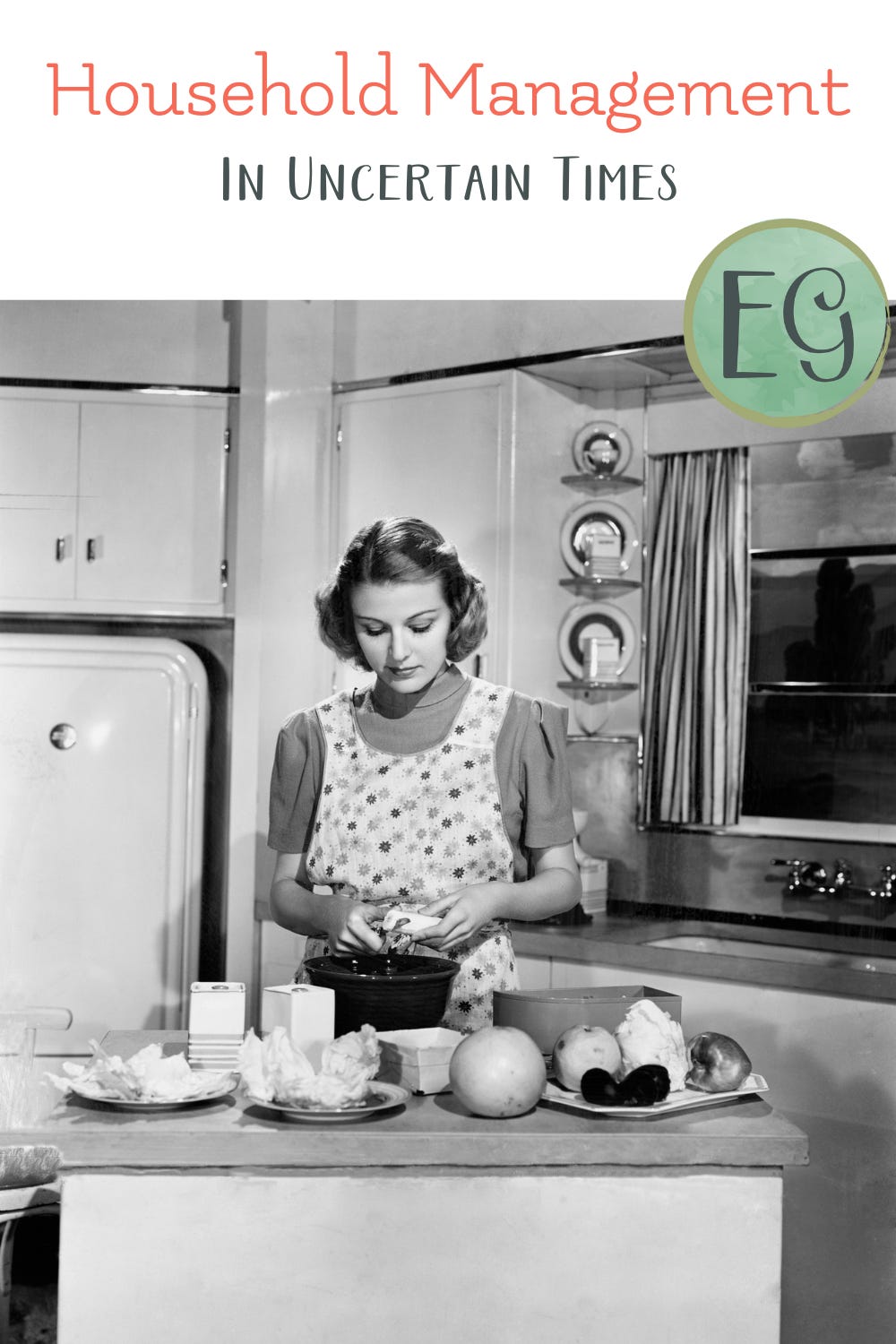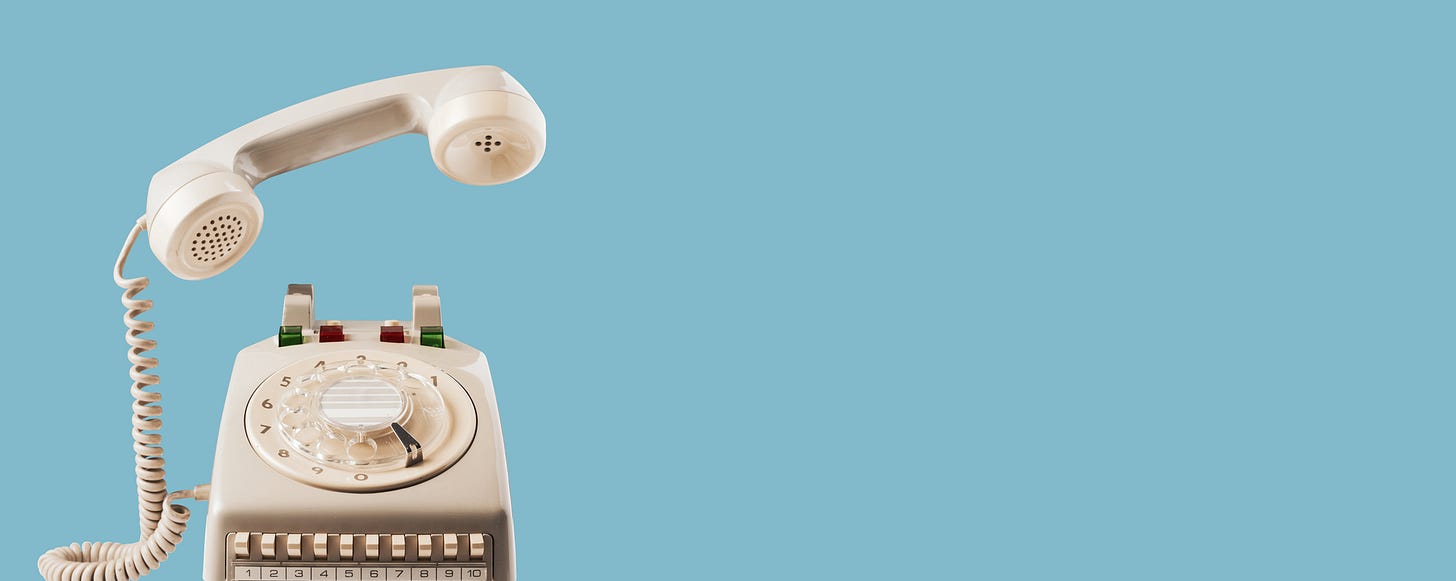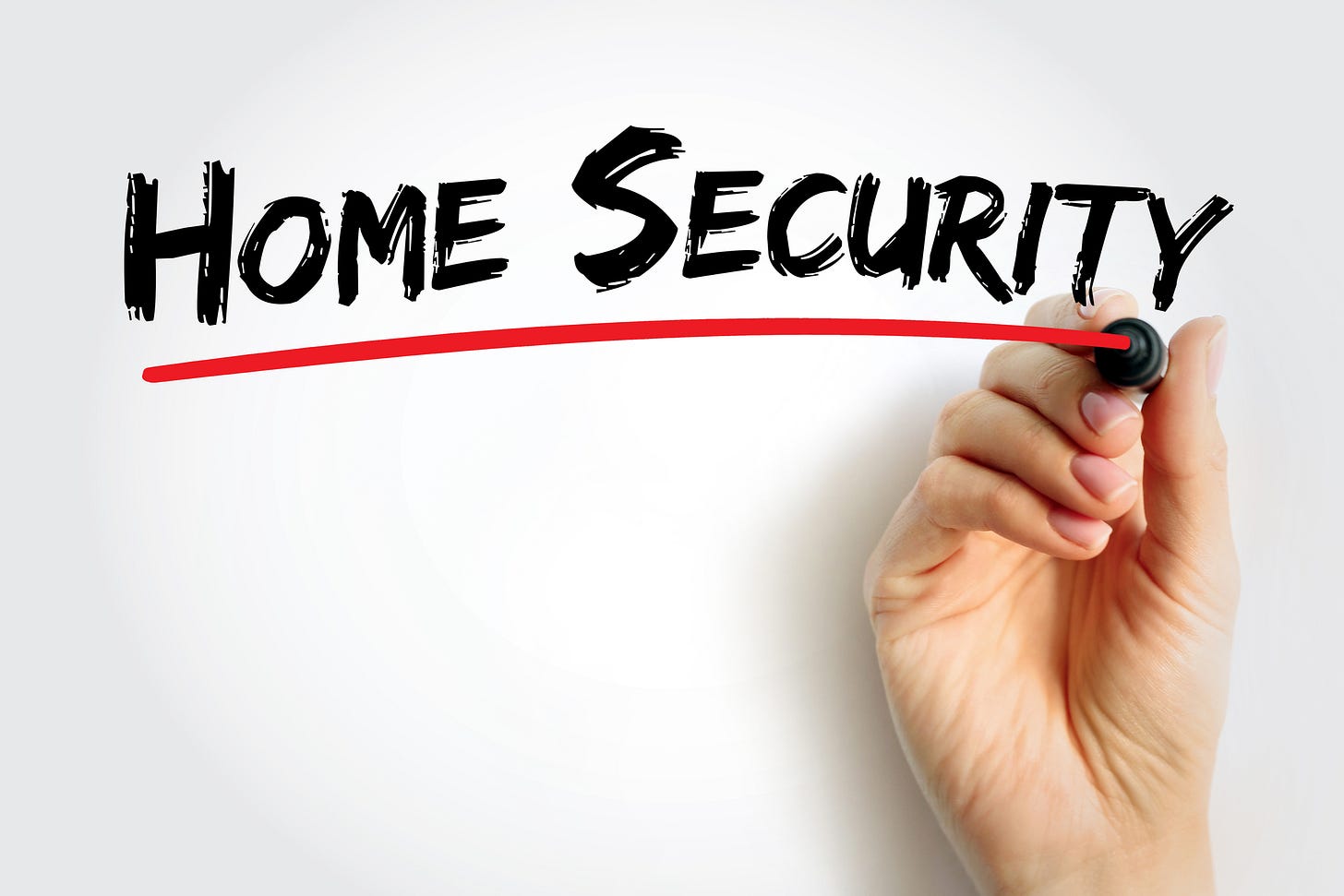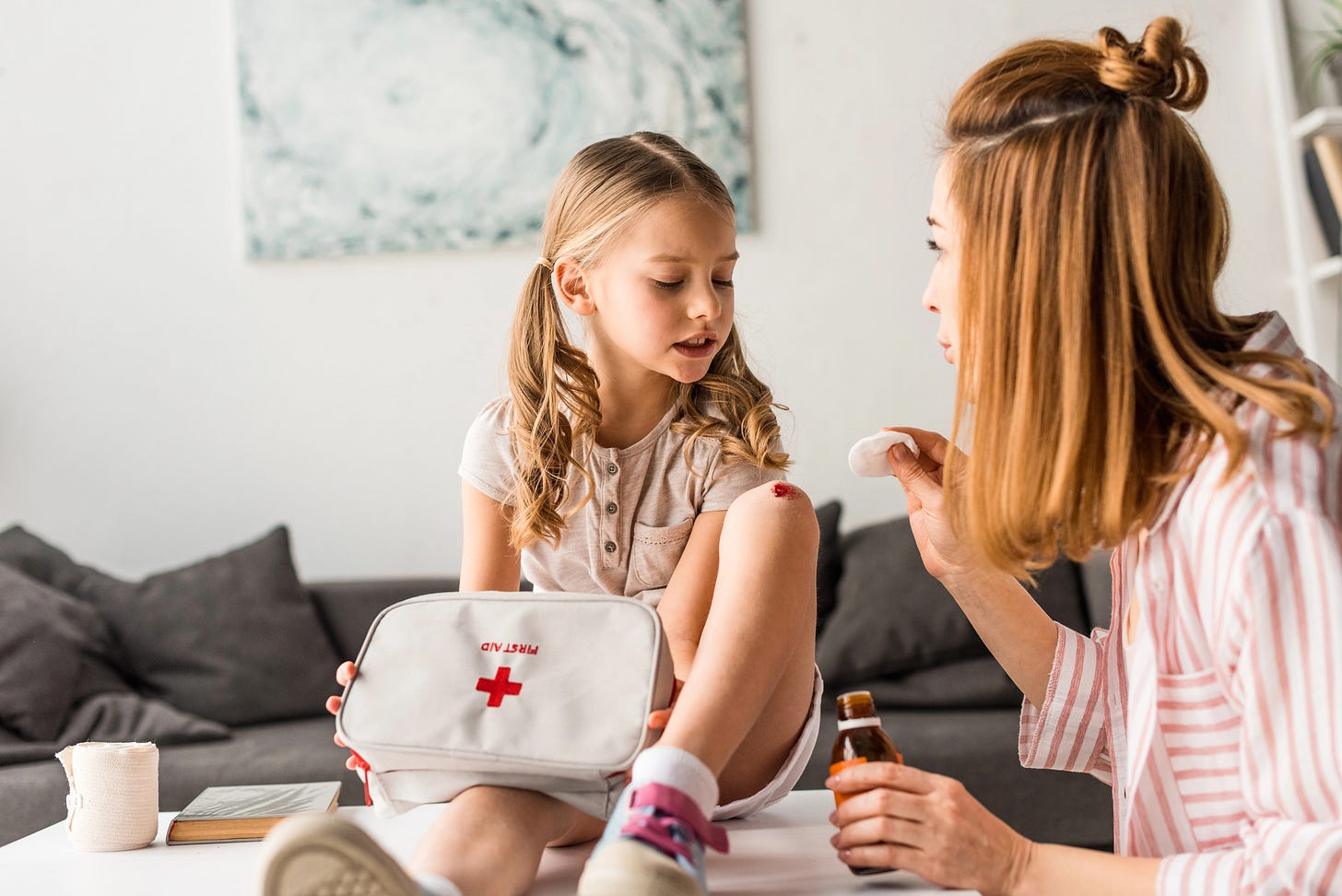Most of us didn’t grow up with the mindset of our our grandparents: “Use it up. Wear it out. Make it do, or do without.” And that has left us feeling a little floundering with inflation rising, layoffs happening in many sectors, supply chain disruptions, shortages, and the spirit of unrest both here in our nation and on the world stage. It’s a lot, but it’s nothing new.
There is no reason we cannot learn to be more resilient and self- and community-sufficient. If that mindset had been passed on, perhaps we wouldn’t have seen people scrambling to buy up toilet paper and hand soap when the virus that shall not be named hit ;) So this is my very simple, absolute-beginner guide to putting your household in order.
FEMA is telling people to have at least 3 days worth of supplies in their homes. You may think this is silly, but the average household does not have more than 3 days worth of meals. As far back as 1906 when Alfred Lewis stated, “There are only nine meals between mankind and anarchy”, people have been creatures of convenience and expect to just be able to go to the market and pickup whatever we need. When we can’t, things get sketchy fast. We saw this happen during Katrina, and to a lesser degree during the 3+ day freeze of Texas in more recent memory. When people, and especially their children, are hungry they will do very out-of-character things to feed them.
Food and water shortages cause fear, and fear causes irrational behavior. This can be seen playing out during natural disasters, hyper-inflationary scenarios (see Venezuela), and war.
The first thing you need to do is setup a system to track everything. Then begin to stock what you decide you need that is within your budget. I created a household management planner that I use - you may be a spreadsheet person. Find a system that you will use and then begin!
The first thing most people gravitate toward is having a larger store of food in their pantry. Start slowly by building up to a week’s worth of stores, then a month, then two months, etc.
***If you have special dietary needs this is even more important. I have a friend with a child that only eats a particular brand of macaroni, myself and my two boys cannot eat anything containing gluten, and we know many with other food allergies. During 2020 there were multiple things that were out of stock for months on end that we normally purchased. We learned how to make them ourselves and some of those products never came back.***
I am grateful to be of service and bring you quality homeschool and homemaking content. As an Amazon Associate I earn from qualifying purchases.
My favorite ways to stock my pantry:
Shop the sales and loss leaders at your local grocery store. Each week add 1-2 extra cans or shelf-stable packages of things your family enjoys.
Stock up on extra salt and spices when they are on sale. If you purchase “camping food” for an emergency situation (our family likes ReadyHour and Mountain House because both have tasty gluten-free options and don’t usually need extra help), it often needs help to be more palatable. This is also important if you are buying dried beans and you are not used to cooking them or eating them. Seasoning is important.
Canning fresh produce and meat to have on hand for later is preferable to freezing for me because I’ve had freezers go out twice and lost hundreds of dollars of food. So I can when the veggies and fruits come in and can meat in the winter because it keeps the house warmer. Find our favorite canning, gardening and preserving books here.
Buy in bulk -I shop Azure Standard monthly for things we use a lot of. Bulk purchases help save money and make it easier to stock up on things your family uses a lot of.
Use Gamma lid pet-food containers for storing bulk items. Keeping bulk purchases fresh and pest-free is important to prevent waste. We store sugar, rolled oats, rice, and flour in these containers.
Water and juice - Clean water is necessary, juice is a great way to flavor it if you need to cover the taste of purification tablets. Storing several gallons of water per person is always a good idea. Even in non-disaster situations, like when a waterline broke a few months ago near our home and a boil water advisory was issued, having water on-hand is a benefit. I suggest having multiple ways to purify water as well: Lifestraws, Gravity Filters, Tablets, etc. It’s good to have redundancy so get a few, not just one.
ROTATE - this is important for your pantry in general and is just good household management, but please remember to rotate everything in your pantry. Cleaning out your pantry, refrigerator, and freezers once every 6 months at a minimum will help prevent you from losing things to spoilage and that helps keep your budget in line.
Communication
Any time there is a cell or general phone outage, which has happened several times during 2024 (including 911 call centers), it makes people think about how to connect without the usual ways. By the time the outage is over, most people just forget about it.
If staying connected to family, friends, and emergency services as well as knowing what is going on in the area around you is of importance to you, these are my suggestions:
A good quality battery/solar weather radio with AM wave capacity
A set of Baofengs - it’s entry level Ham radio and works great (study up and get your license if you want to be able to talk with the other Hams regularly)
The Guerilla’s Guide to the Baofeng Radio by NC Scout (my husband enjoyed this one)
The Cartoon Ham Exam Handbook by Aden Tate- both my boys loved this and it’s worth tracking down a used copy.
Walkie Talkies - these are shorter range but work great for keeping communication open with neighbors in case anyone, especially older friends or families with small children, needs help or has an emergency.
Home Security
We live in a world where it’s just not a good idea anymore to leave the front door unlocked while you take a walk down to the town square for a milkshake. (I was fortunate to grow up in a tiny little Tennessee town where that really was my childhood- the soda fountain was actually inside a pharmacy)
Home security, like all security, begins with situational awareness. If you are not familiar with situational awareness, please read the books by Gary Dean Quesenberry Spotting Danger Before It Spots You and Spotting Danger Before It Spots Your Kids. Knowing your surroundings is imperative in the current culture.
For home situational awareness, you need a good security system and doing a thorough area study is a great idea. We like Wyze cameras and signage that lets people know our property is under video surveillance.
Basic home security:
Keep your doors and windows locked
Have cameras that alert you to movement and people
If you have a home alarm system, use it when you’re home and when you’re away
If you’re out late, leave a light or two on and a vehicle in the driveway if possible
Know your state’s self-defense laws and prepare accordingly
Do not, under any circumstances, post on social media that you will be going away. Do not post pictures of vacation until you are home. Do not post things online that give away your schedule.
Periodically check the perimeter of your property for any signs of trespassing or anything out of the ordinary
A note on self-defense - every state has slightly different laws. Knowing the laws of your state and if they support castle doctrine or stand-your-ground laws is important. If you decide to have “protective measures” of any variety, you also need to have made the decision well beforehand that you are willing to use them.
First Aid and Medical Supplies
One of the most important skills you can have, emergency or not, are first aid skills. Keeping a well stocked first aid kit should be a normal thing, but we’ve had neighbors come by to borrow bandaids so …
Tips for medications/vitamins/etc
Keep backups of any medication on hand if possible. Most doctors will give you a 90 day prescription if you ask.
If you have temperature sensitive medications like insulin, invest in a small cooler that can run off your car, battery bank, or solar.
Keep a 90 day supply of essential vitamins and things like ibuprofen
Always have at least one backup of lifesaving medications like Epipens
First Aid Kits
While you can purchase larger kits or items, at the very least you need a kit with wound wash, multiple sizes of bandaids, and antibiotic ointment. Here are some of the things in our FAK (we camp a lot and do a lot of woodworking so we like to be prepared for whatever):
A suture kit
tourniquets
splints
antiseptic wash
saline solution (for wounds and eyes)
bandages (bandaids, wraps, gauzes, etc)
thermometers
pain relievers/NSAIDs
EpiPens (one child has anaphylaxis)
burn gel
BleedStop powders and bandages
hydrocortisone
antibiotic gel
iodine
tweezers
flashlight
poison ivy wash and lotion
thermal blankets
If you’re looking for medicines, places like Jase Case offer them in case there is another round of shortages. I use a lot of herbs for our health and recommend The Healing Garden book for learning about using herbs.
In Part 2, we will talk about books, skills, comfort items, cleaning, and more!









